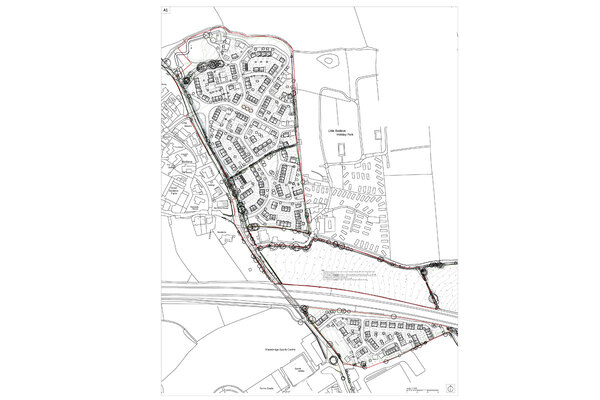You are viewing 1 of your 1 free articles
Neil Hadden: The full interview
Following the reaction to the news that Genesis is moving away from the development of sub-market rent, we present the full interview between Neil Hadden and Inside Housing’s Pete Apps.
The Budget last week was described quite widely as a watershed moment for the sector, do you share that view?
Very much so I think this is as big if not bigger than 1988 when private finance came in, when local authority stock transfers to housing associations were facilitated. The world was coming to an end in 1988, we survived that. People are throwing their hands up in horror about what happened in the Budget, we will survive that. But more importantly it’s not just about survival it’s about looking for the opportunities that have been created.
What opportunities do you see?
You might recall that Genesis has been quite vocal in saying that associations have to be more commercial, have to be more professional, have to get into the new decade, rather than stick in the past, and I think this is a real shove towards becoming a more dynamic, agile, more nimble organisation which still has at its core its social purpose of helping people who can’t access housing through the market but has to think of different ways of doing it. We’ve been working on PRS type schemes for a number of years, we’ve built for outright sale, we see that these will be increasingly important aspects of what we do. Linked to that, I think there’s also the opportunity to redraw the contract between housing associations and the government stroke regulator.
Picking up on the PRS and market sale element becoming a more important aspect of what you do, what do you mean by that?
Our current development programme is configured on the basis that we produce a third social housing or affordable housing, a third intermediate tenure, such as shared ownership, and a third for the market. We’ve been having discussions in the light of the budget and we really think that the affordable rent element has gone and therefore we should be looking more at a 50/50 split between intermediate tenures, such as shared ownership and market rent stroke outright sale.
“We really think that the affordable rent element has gone.”
What is it particularly about the Budget that’s pushed you down that road?
It’s going to be very difficult to make schemes stack up for affordable rent with the reductions in rent over the next four years. I also happen to believe that this government is not particularly interested in us producing affordable rented accommodation they see the social sector as being a safety net helping those most vulnerable in society, which is where our social purpose comes in, and the market provides for the rest. And I think that’s a big paradigm shift the sector is going to have to get used to.
If that’s the government’s point of view, do you share it?
I am a realist, a pragmatist. We do not work in a bubble we work within an operating environment that exists. We have to react, we have to respond, we have to get ahead of the curve. We can spend all our lives bellyaching, but is that going to change anything? Waste of time and effort – I would rather think about what does that mean for my organisation and move forward.
There are other housing associations who wouldn’t say they can make affordable rent work, so why is Geneis different?
We’ve probably got our ear closer to the ground.
What do you mean by that?
There’s not going to be any grant for affordable housing, so how will other associations make it stack up?
I’m sure there will be people who say this is not the route associations should be going down. What would you say to them?
For a number of years I’ve been saying that you need to have a redefinition of social purpose and the core objectives of housing associations. I’ve been around for a long time in this sector, and when I joined housing associations were the third arm. They helped people who couldn’t get council housing, or couldn’t purchase homes to own and occupy. We’re going back into that territory. We are not able, or indeed being asked to provide affordable and social rented accommodation for people who should be looking to the market to solve their own problems. I really do think, going back to your original question, it is a massive watershed in all sorts of ways. We should be looking redefine why we’re here.
And why are you here?
To help people access housing at all different sorts of price points.
You need quite a high income to get shared ownership or market rent in the areas you work. Would it concern you that there are people on the lowest incomes who you wouldn’t be providing for?
I could be really harsh and say that won’t be my problem. My problem will be to supply new housing at different price points in locations where the economics of those schemes stack up and because of where we work, the demand will be there for those properties.
Would you expect to develop more properties?
I am looking to see whether we can, I would dearly love to.
Do you have any idea how much you could increase your development by?
It’s very early days. We are looking at a number of things. I do think that the budget is about the efficiency of the sector as it is about anything else. We are looking at our operating costs, we slashed nearly £20m a year out of operating costs through our transformation programme last year, we are looking again to see at how deeper we can dive in even further and cut even more costs [by] reconfiguring the way we deliver services, perhaps take out some services completely. That’s one thing. Then reconfiguring the development programme.
It does seem to me, the more we do of shared ownership and outright sale, you are getting proceeds coming back in to fuel development. And the third thing we are doing, and something we have been doing for a number of years, is really looking at our asset base and seeing what the value of that is and how we can get our hands on that value, by changing its tenure, by churning it, by selling it and using those proceeds to build more homes.
Is that an area you are looking to scale up?
Very much so.
What is the plan for void properties?
Every void property will be looked at to see whether we should switch its tenure or whether we should sell it.
You would make that decision on what basis?
It’s a multi-faceted process, the management arrangements need to be looked at. The inherent maintenance costs of that property, is the cost of repairing worth meeting? The economic performance of that property. The fourth area will be what is the value of that property.
We are in a very fortunate position working in the areas we do where property values are very expensive. We can put millions of pounds into the busisness and recycle that and build more homes.
In terms of what happens in the immediate term – I think Genesis has a little bit of grant under the 2015/18 programme – is that still going to build affordable rented housing?
We are looking at every scheme in the programme, both pipeline and yet to be committed to see how they stack up given the new rent arrangements and we’ve already started to reduce our offers if they are section 106 schemes and we’re also looking to see whether we should change the tenure mix.
“We are looking at every scheme in the programme, both pipeline and yet to be committed to see how they stack up given the new rent arrangements.”
Do you think the HCA or GLA would be content for you to do that?
That is a bridge we are still to cross, I do think the GLA will be sensible and realistic and work with us because their job is to promote the delivery of housing. They have to adjust to the new paradigm as much as we do.
Will you still be a housing association after this change or something different?
We could become something different. I don’t know where this will lead at the end of the day, we haven’t really had a chance to think strategically about all of that, but I think there are great opportunities opening up to reduce some of the regulation we go through. We haven’t really had the chance to think strategically about that yet, but I think there are great opportunities opening up if we can reduce some of the unnecessary regulation we have to go through, we can create a different relationship with government and where does that lead I don’t know I’ve got an open mind on that.
What do you regard as unnecessary regulation?
What do you regard as unnecessary regulation?
Why do we have to follow OJEU [European tendering rules], we’re not a public body. That adds cost and time to our tendering processes. That is unnecessary bureaucracy, you have to set up frameworks. All the consents you have to go through to dispose of assets, assets that we own, assets that increasingly have less and less grant in them. Rules around RCGF [Recycled Capital Grant funding], which is the same point about disposals, we could account for all of that in our accounts we don’t have to have separate funds and separate arrangements to report on that, and there are other things as well.
I happen to think that the move towards In Depth Assessments is wrong - it’s wrong headed. I think it’s unnecessary. I think it’s a knee jerk reaction from the regulator and I think it’s not in tune with where I think we should be going.
Why do you think that? Is the regulator taking too much control?
Yeah. [They are] getting involved in things that are none of their business, if you look at the regulatory framework that is on their website, it talks about areas that the IDA will look at. Well strategy, what’s that got to do with them, we are an independent private business. My board signs off the strategy. Secondly, they look at the structure, what’s that to do with them?
Would you see any regulation at all?
There needs to be some regulation, it does provide some comfort for all the various parties, but I think it needs to be proportionate, even more proportionate than it is now. It needs to concentrate on the key things like are we a financially viable organisation, and are we governed well. That’s the key standard all the rest is pretty peripheral. Customer engagement, what’s that about?
How do you Genesis and the sector moving towards that new relationship?
We’ve got a lot of work to do, got to get in there and have a dialogue with government at the highest levels about what they want from the sector, what sort of sector they are looking for. The mantra is of course, they want what works, so we have to demonstrate that we are able to meet their ambitions, particularly in terms of supply over the next few years. So it’s not a one way street of just going and asking for stuff, but going to government and saying this is what we can offer but if you get with us on some of the other stuff, it will free us up to do even more. So it’s about having a mature dialogue rather than sitting here waiting to be told what to do.
To what extend is that already underway?
Well I’ve started it.
What is the pitch you are making?
I’ve talked about some of the elements already. We will build more homes in return for even greater freedoms and flexibilities.
Would you expect the Policy Exchange report suggestions to be picked up?
Would you expect the Policy Exchange report suggestions to be picked up?
Yes I think there’s a lot in that report that should be re-read and revisited by a lot of people, there’s a lot of sense in there, and repaying grant or having grant written off I think would go a long way to help us have the capacity to do the things that government wants us to do and that we ourselves want to do because that’s why we’re here.
How receptive are you finding government to these ideas?
Very, very receptive. I think we have to realise that the government has not just hit upon a few measures and thrown them into the mix, I believe that they have a plan and the Budget was the first stage of the plan. There will be further iterations of the plan in the spending review. We’ve already seen haven’t we the Chancellor wants to see 25%, 40% reductions in public spending. Where’s the CLG and HCA going to fit in that? Massive, massive reductions potentially. That’s going to come about. There will be further budgets, further spending reviews. This is about the efficiency of the sector.
“The government has not just hit upon a few measures and thrown them into the mix, I believe that they have a plan and the Budget was the first stage of the plan.”
Where do you think the plan ultimately leads?
I think it leads to a slimmer, trimmer sector. I think it leads to this sensible, adult, mature relationship with government. We are characterised, aren’t we, by being whingers and grant junkies. We have to change that perception and show that we can do things, that we can be a partner with government. I think there’s a real feeling, and it came through that news article last night (on Channel 4) that assoociations are part of the problem not part of the solution, and we’ve got to change that perception.
Do you think there is anything negative wrapped up in the direction of travel as well?
There are always pitfalls and consequences that we haven’t fully worked through and we have to manage those as we go along. But this is all part of my vision that we become organisations that are in charge of their own destiny, have worked out what the risks are and have got risk management strategies in place to deal with them and we should be allowed to get on with it.
Is this something the board at Genesis and other people at Genesis are on the same wavelength as you about?
The Genesis board has backed our corporate strategy, they signed off the corporate strategy, they were happy that we sponsored the Policy Exchange report. They know what the direction of travel is. We haven’t gone into the detail yet about exactly what our responses are going to be to the new paradigm and we’ve got sessions set up for that. We have a board meeting next week, it’s our AGM next week, we’ve got a board away day in October, we will have the new iteration of the financial plan. So there will be discussions going on over the next few months.
“The Genesis board has backed our corporate strategy, they signed off the corporate strategy… They know what the direction of travel is.”
Do you think this time next year Genesis is going to be registered with the HCA?
I think 12 months is in this respect quite a short period of time. I would hope that we were a long way down a path which would lead to a more sensible relationship between us, government and the regulator. If that led to deregistration, would I be upset? No.
Do you see more direct things – things that have been talked about in the past – such as government coming after housing associations who aren’t developing and taxing surpluses – is that part of the plan?
Well I don’t want to put words in government ministers minds, but we have to be alive to all of those possibilities. I follow what happens in other countries, like America or Holland, and stuff like taxing surpluses and not providing 100% of housing benefit tenants are entitled to are things I’m sure this government has thought about or will think about in the future. And the danger of us doing more and more commercial activity is that we will be subject to more and more corporation type taxes, that will have to be part of the territory.
Those associations that don’t embrace this agenda or can’t embrace this agenda will have to look very carefully at their futures. My line always in this which is why I talk about being a pragmatist, a realist is that we should be in charge of our own futures and not have things done to us.
Is consolidation part of the future strategy?
Very much so, consolidation has to be on the agenda. You heard it last night in that programme [Channel 4 news], bleating about the fact that there’s 1,500 associations and then they do some stupid calculations about how many homes we all build and its nonsense of course, but there is unused capacity in this sector and this government, as indeed governments in the past have, want to use that capacity to build homes and one way of doing that is consolidation.
Any immediate plans at Genesis?
We are always talking and thinking about how we might play a role in that consolidation.
How fair do you think the criticism on Channel 4 last night was?
I don’t think fairness comes into it. We are there to be shot at like other sectors, and the worst thing we can do is be defensive. We should restate what we do, we should engage positively with the new agenda. The more we react negatively to criticism, the more that story gains ground. And I know you won’t like to hear it, I think its tomorrow’s chip wrapper paper, you keep asking for the right to reply and it goes on and on the more people think there’s no smoke without fire.
Speaking about Genesis and the development programme – what timescale are we talking about in terms of going from 30/30/30 to 50/50?
It’s ongoing work, the focus for the other pieces of work I mentioned is the first of April next year, we want to get things in place. We want to be ahead of the curve. Our income will reduce by about £3m next year compared to our financial plan. That will be £6m next year if we don’t do something now. Those reductions in income are going to hit us hard and we’ll have to make even bigger reductions so we want to get ahead of it now.
You’ve got lenders to think about – how are they reacting?
We are negotiating with banks at the moment to borrow more money, there is no indication they are going to withdraw those offers.
That’s on the basis of the new plan?
We haven’t gone into detail about the new plan, but they know what the corporate strategy is they know the approach that Genesis takes, they see us as sound businesses.
“We are there to be shot at like other sectors, and the worst thing we can do is be defensive.”
Where do you stand on the Right to Buy?
Our official line, and this has been agreed with the chairman and the board, is that we support the Right to Buy for two reasons: one we already build for the market, outright sale, PRS, wouldn’t it be odd if we set our face against helping people buy thier own home? The second reason is we have for a number of years been churning our stock, well this is another way of churning our stock, getting that value back into the business, doing more things. The big caveat in that is understanding the rules of the game and knowing what compensation we can get for the discount and are we able to keep that promise of one for one replacement. I happen to think we can do more than one for one replacement if we are talking about different tenure types. We could get more shared ownership for each social rent property sold, so more households are housed. Isn’t that the name of the game?
You are reacting to this slightly differently to some other chief executives, particularly on the Right to Buy. Why do you think others are so upset in comparison?
It’s very difficult for me to talk about others. But I think its part and parcel of this image of the sector, where the first reaction is to whinge and bleat and then over time they will sit down and think about it and think of the positives. I wish people would sit and think first before whinging and bleating.
“I wish people would sit and think first before whinging and bleating.”
Genesis has obviously been around for a number of years providing homes for people on low incomes, do you feel something is being lost?
Genesis has obviously been around for a number of years providing homes for people on low incomes, do you feel something is being lost?
The starting thing is we’ve got 16,000 homes for general needs tenants. That is not going to disappear overnight. We are still going to be managing that to the best of our ability, we are going to look at how we reconfigure services to those tenants. We will help them to buy if they’ve got the Right to Buy but alongside that we will be building lots more shared ownership and a lot more other housing options for people who wouldn’t traditionally look to housing associaitons to meet their housing need. So I see it as an evolution of what we’re here for.
As you look back over the last forty years or so, the first part of that forty years was about associations coming into business, getting a shedload of grant thrown at them, which basically was a set up process. Then 1988 came along we had to look at the private funding market and we were told by Thatcher we had to take over from councils as the main provider of new social housing, so that switched the emphasis of the sector. Now we’ve got this period, which is the third phase as I call it, which in retrospect really started in 2010 with the reduction of grant and the focus on affordable rather than social. We have to get as they say, with the programme. We have to realise that that’s what’s happening. You can set your mind against it if you want to but it seems to me that putting your head in the sand means that someone tramples all over you and I don’t want Genesis to do that, I want Genesis to be at the forefront of this new stage in the evolution of the sector.
Is there anything else in the business that will need to change?
We are investigating very, very hard the use of digital technology on the way we deliver services, so people can go online and contact us immediately. And just be better and speedier at delivering services, and that really will change the relationship between us and our customers.
There’s been this relationship built over time about us having housing managers who sort out the problems for our tenants. Well realistically, can we afford that going forward? And is it the right way to be doing things anyway? Isn’t the move towards self-sufficiency about looking after yourself?
I’m not saying that’s the case for the most vulnerable in society, and we are very proud of our care and support activities and of course we are the largest provider of temporary housing for people who need something quickly and we will continue to do all of that. But I’m talking about for the ordinary general needs side of the business.
“Isn’t the move towards self-sufficiency about looking after yourself?”
So care and support continues in this new vision?
It was kept out of all the cuts from the benefit system in the budget. Vulnerable people are protected, and that is one way that we will keep hold of our social purpose.
What’s the size of care and support side of your business?
Three and a half thousand bed spaces, and on top of that some supported housing.
Would you look to develop more of that?
Whether we would develop it more or enter into contracts on behalf of others, we are in the process of relooking at strategy in that area, and that’s coming up to the executive and board later this year.










